This article was co-authored by wikiHow Staff. Our trained team of editors and researchers validate articles for accuracy and comprehensiveness. wikiHow's Content Management Team carefully monitors the work from our editorial staff to ensure that each article is backed by trusted research and meets our high quality standards.
There are 12 references cited in this article, which can be found at the bottom of the page.
wikiHow marks an article as reader-approved once it receives enough positive feedback. In this case, 85% of readers who voted found the article helpful, earning it our reader-approved status.
This article has been viewed 135,647 times.
Learn more...
Visiting a Hindu temple can be a powerful cultural and religious experience. However, you need to prepare so that you are respectful of those worshiping. It is important to understand the rules, practices, and customs of the religion before venturing into the temple.
Steps
Praying
-
1Understand Hindu polytheism. Hinduism is both polytheist and monotheist. That means Hindus believe in many gods, but that they are all parts of a single god. This means that Hinduism is both diverse, with an array of gods and rituals, but also united in the belief of a single god.[1]
- Hinduism has thousands of gods and many of these gods manifest themselves in different forms.
- Brahman is the leading god and represents both existence, and non-existence.
- The three most important manifestations of Brahman are Brahma, Vishnu, and Shiva. Roughly speaking, Brahma is the creator god. Vishnu is the responsible for preserving creation. Finally, Shiva is the god of destruction or nonexistence.[2]
-
2Repeat mantras. Mantras are sayings that are repeated to gods, sometimes specific gods, as a way to ask for a specific outcome.[3] You can repeat these mantras to one of the deities at the temple. Verify that the mantra is appropriate for the god to which you are praying.
- One of the most popular mantras is “OM Namo Bhagavate Vasudevaya.”
Advertisement -
3Perform a japa. Japa is a way to clear your mind by focusing on a holy passage or the name of a god. Instead of asking for something, you are devoting yourself to the truth of what you are saying to accept the wisdom and serenity of mind that comes with it. You should count the repetitions of the mantra with a mala, a string of beads similar to a rosary.[4] [5]
- A mala has 108 beads and you should try to do either one full rotation or ten. There is one particularly big bead, known as the head bead. Start at the bead directly after the head bead and roll it around with your thumb every time you repeat the mantra. When you reach the head bead, you have completed a full rotation. [6]
- One good pose for performing japa is Padmasana. This is a basic cross-legged position in which you keep your body posture upright and your feet on top of the thigh of your opposite leg.[7]
- Face north or east while preforming the japa.
- Sit on a rug.
- Do not hurry through the chant. Perform the chant slowly, concentrating on it, timing it with the slow pace of your your breathing.
- Avoid distractions. Focus intently on the meaning of the mantra. Your goal is to clear your mind.
-
4Sing bhajans. Bhajans are songs that are sung in groups, in front of an image of the deity. You will need to arrive at the temple when the priests are leading a bajan. Sing along with the group.[8]
- A bhajan is sung in a group, not alone, so you will need to coordinate with others to perform one.[9]
- Temples will typically publicize times on which they will be performing a bhajan. Some will even include records of the bhajan, so that you can practice in advance. Review the website for information.
Preparing to Visit the Temple
-
1Dress appropriately. In accordance with religious beliefs, avoid showing too much flesh. Make sure that shirts and tops have sleeves and that shorts and skirts fall below the knee. Women should avoid wearing low cut blouses and fasten all buttons. Don't wear clothes that have offensive slogans or sexual overtones.
- It is typical for men to wear slacks and a button up shirt. Typical business casual attire should suffice.
- Women are more inclined to dress up in traditional Indian attire. This is not mandatory, however, you might feel out of place without it. Consider a long kurta top with leggings or pants.
- For women wearing western attire, consider a long, loose dress. You should be comfortable sitting cross-legged in the dress.
- Hinduism is a large, diverse religion, so attire can differ from one temple to the other. In some temples, it Is much less common to wear western attire. Western attire is banned in some parts of India.[10]
- Do not wear animal skin, including leather. [11]
-
2Be respectful. Refrain from speaking or laughing loudly. Public displays of affection are inappropriate. If you are offered food, watch others first. Observe whether they say prayers and, if so, do the same before taking the food.
-
3Wear appropriate footwear. You will need to take your shoes off at the temple. Therefore, you should consider footwear that is easy to remove. You might, however, keep on your socks. So be sure that your socks are clean and presentable.[12]
-
4Research the temple’s schedule. You can visit to pray throughout the day. However, temples will perform rituals several times a day. Try to research the schedule in advance online. That way, you can time your visit to either be present or not be present during one of these rituals.[13]
Arriving at the Temple
-
1Remove your shoes. It is important to remove you shoes before entering a temple. Upon entering you should be directed as to where to deposit the shoes and informed of any other requirements for your attire.[14]
-
2Greet each god in counterclockwise order. Upon entering, turn to your left and find the first statue of a god. Pay your respects by either assuming the Namaste pose or going prostrate. Continue until you have gone around the temple and greeted each god in this fashion.
- For Namaste, put your hands together in front of you in a praying motion. Bend your head down slightly.
- Alternatively, you can go all the way down to your knees and bow your head to the ground.
- The gods will likely have their own alcoves, little spaces cut out in the wall that act like their “homes.”[17]
-
3Join rituals. If there is a gathering of people, they priests might be performing a ritual. After greeting each of the gods, you can join the group. Before joining, however, you should check to see if the group is divided between men and women. If so, join the group appropriate for your gender.
- Some temples divide services up by gender, but others do not.
- Pay attention to what others involved in the ritual are doing and repeat their actions.
- Also, observe how people greet each other. Often, instead of saying “hello,” they will say “Hari om” or “Sai Ram.”[18]
-
4Touch the lamp. One common ritual involves priests walking in front of the crowd with lamps. For this ritual, you will want to hold your hand out over the lamp as it passes and then bring your hand back to your eyes. Do this three times and on the third time brush your hand over the top of your head.
- This ritual represents bringing the spirit of the fire inside of yourself.[19]
-
5Consume the sweets or fruits. The priests might walk around with bowl of liquid or fruit. Hold your hands out in a cupped position, with your right hand over your left hand. When the priest provides you with the liquid or fruit, consume it immediately.
- After drinking the liquid, rub anything remaining on the top of your head.
- Watch what others are doing to make sure that you are following proper decorum. Rituals can vary somewhat from place to play.
- These offerings are considered a blessing from god. They are formally known as either prasadam or prasad.[20]
-
6Allow your forehead to be marked. The priest might walk around marking heads with kumkum, ash, or turmeric. This is a blessing of your third eye. Simply allow the priest to touch your forehead, possibly bending forward slightly to offer your forehead.[21]
-
7Behave. Be sedate and respectful and avoid loud conversation and laughter. Don't make comments criticizing the religion or culture. Always bear in mind that the temple is a sacred space for those that are there to worship.
- Extinguish cigarettes before entering and don't bring any food or drink inside the temple. Don't chew gum loudly and always dispose of trash in a trashcan. Turn cell phones and pagers to silent or turn them off completely.
Community Q&A
-
QuestionIs it okay if we worship God in a sitting posture in Hinduism?
 Community AnswerYes, it is appropriate to worship God in a sitting posture in Hinduism. Many rituals are done while seated.
Community AnswerYes, it is appropriate to worship God in a sitting posture in Hinduism. Many rituals are done while seated. -
QuestionWhen I pray for my wishes to be fulfilled, should I pray to one god or all gods?
 Community AnswerYou have to pray to different gods for different things. For example, the Goddess Lakshmi gives you wealth and prosperity. Stand before the idol, open your heart, and ask for what you truly want, but don't be greedy!
Community AnswerYou have to pray to different gods for different things. For example, the Goddess Lakshmi gives you wealth and prosperity. Stand before the idol, open your heart, and ask for what you truly want, but don't be greedy! -
QuestionDo Hindu men and women pray together?
 Community AnswerTypically, yes, but it should be evident upon entering the temple if there is a separation by gender.
Community AnswerTypically, yes, but it should be evident upon entering the temple if there is a separation by gender.
References
- ↑ http://www.huffingtonpost.com/deepa-s-iyer/hindu-temple-visit_b_855277.html
- ↑ https://hinduwebsite.com/hinduism/pantheon.asp
- ↑ https://hinduwebsite.com/prarthanameans.asp
- ↑ http://www.hindupedia.com/en/Japa
- ↑ https://hinduwebsite.com/prarthanameans.asp
- ↑ http://yogabasics.com/japamalabeads/what-is-a-mala/
- ↑ http://www.artofliving.org/us-en/yoga/yoga-poses/lotus-pose-padmasana
- ↑ https://hinduwebsite.com/prarthanameans.asp
- ↑ http://www.indiaparenting.com/indian-culture/73_825/bhajan.html
- ↑ http://www.theguardian.com/world/2016/jan/01/hindu-temples-in-southern-india-enforce-western-clothing-ban
- ↑ http://www.patheos.com/blogs/whitehindu/2014/01/what-to-wear-to-a-hindu-temple/
- ↑ http://www.patheos.com/blogs/whitehindu/2014/01/what-to-wear-to-a-hindu-temple/
- ↑ http://www.patheos.com/blogs/whitehindu/2014/01/what-to-wear-to-a-hindu-temple/
- ↑ http://www.huffingtonpost.com/deepa-s-iyer/hindu-temple-visit_b_855277.html
- ↑ https://www.vilondo.com/bali-travel-guide/bali-temple-etiquette-and-temple-dress-code/
- ↑ http://www.patheos.com/blogs/whitehindu/2013/09/your-first-visit-to-a-hindu-temple/
- ↑ http://www.patheos.com/blogs/whitehindu/2013/09/your-first-visit-to-a-hindu-temple/
- ↑ http://www.patheos.com/blogs/whitehindu/2013/09/your-first-visit-to-a-hindu-temple/
- ↑ http://www.patheos.com/blogs/whitehindu/2013/09/your-first-visit-to-a-hindu-temple/
- ↑ http://www.patheos.com/blogs/whitehindu/2013/09/your-first-visit-to-a-hindu-temple/
- ↑ http://www.patheos.com/blogs/whitehindu/2013/09/your-first-visit-to-a-hindu-temple/
About This Article
Praying in a Hindu temple can be a powerful spiritual experience, but make sure you follow the rules and practices while you’re there. If you want to pray alone, check the temple’s schedule online so you don’t arrive during a ritual. Before you enter, turn your phone on silent and remove your shoes. Speak quietly while you’re inside the temple. To pray, you can repeat mantras to the gods to ask for support or guidance. You can also use mala beads to count your mantras and help clear your mind. If you want to sing bhajans, check the schedule so you can arrive when the priests lead the songs. For more tips, including how to dress when visiting a Hindu temple, read on!

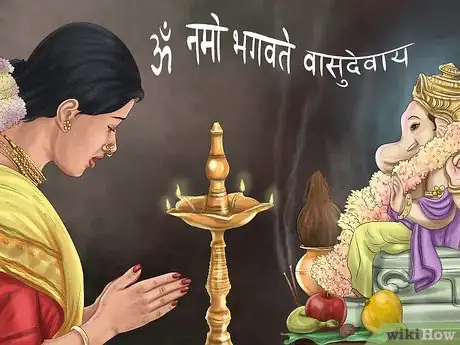

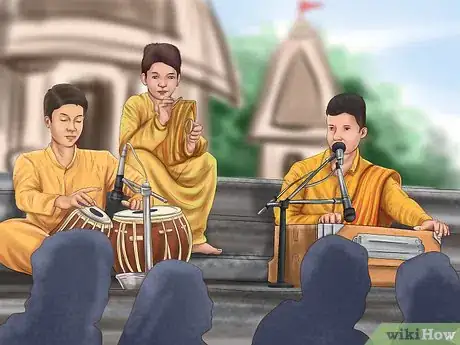
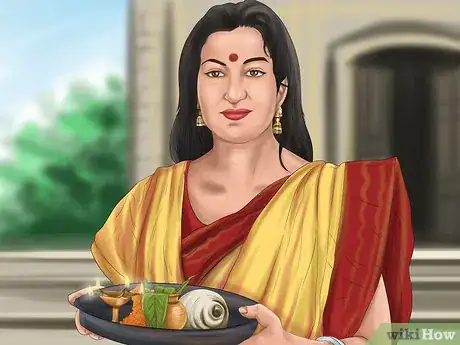
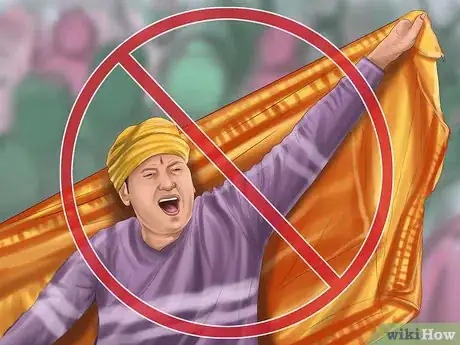



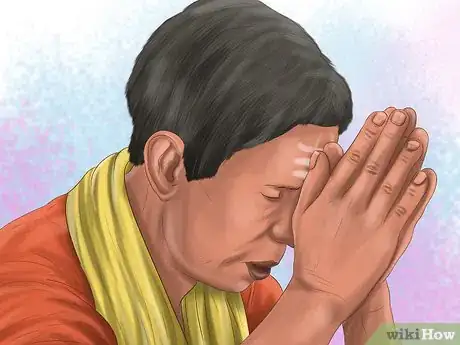
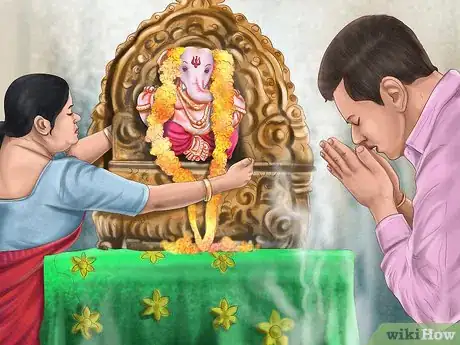
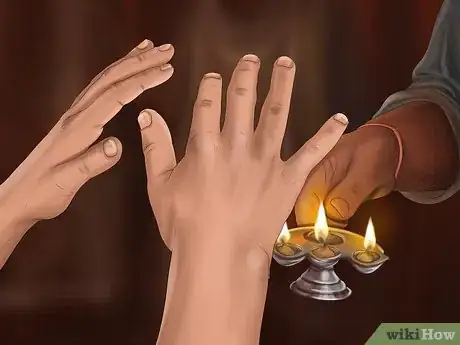

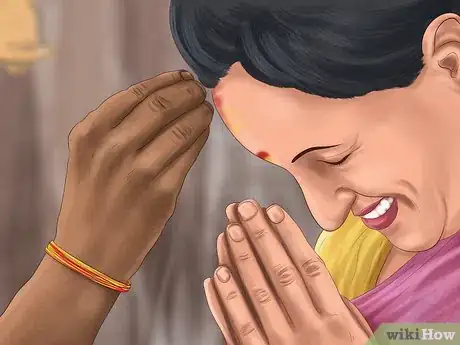



-Step-13.webp)























-Step-13.webp)



































